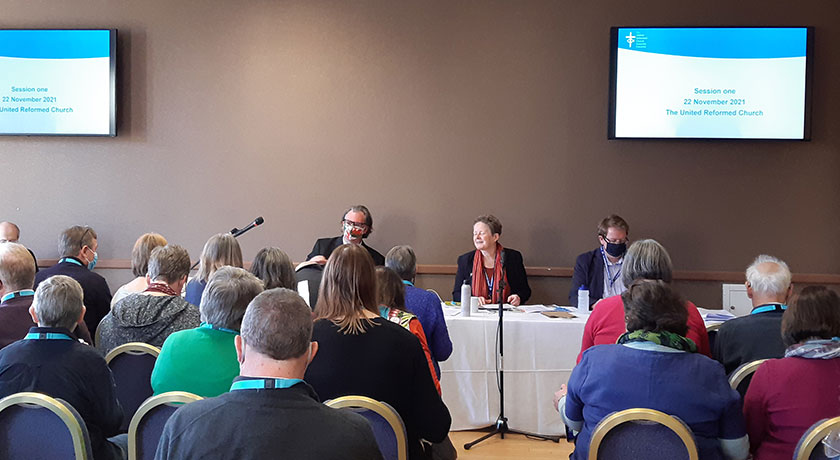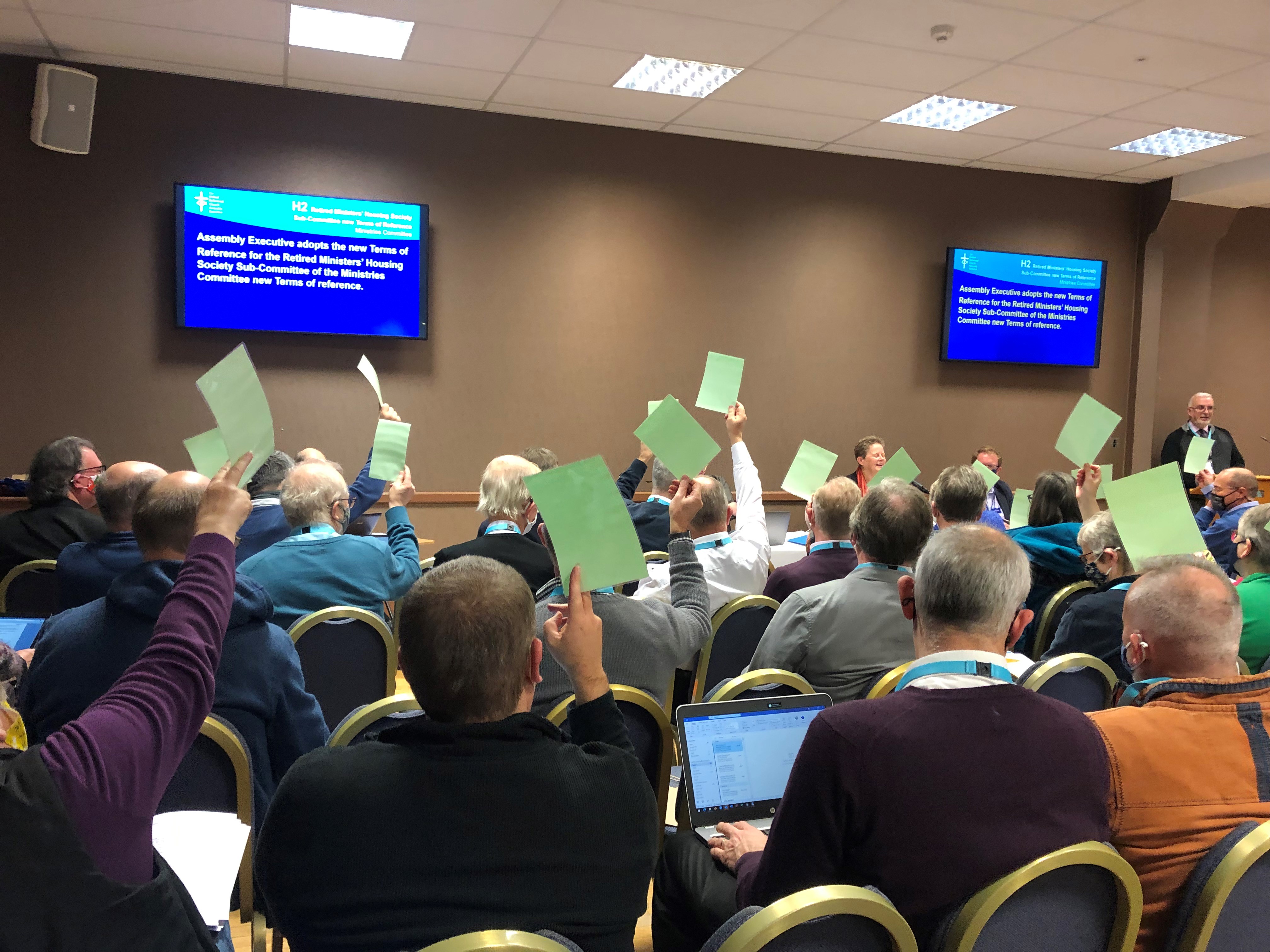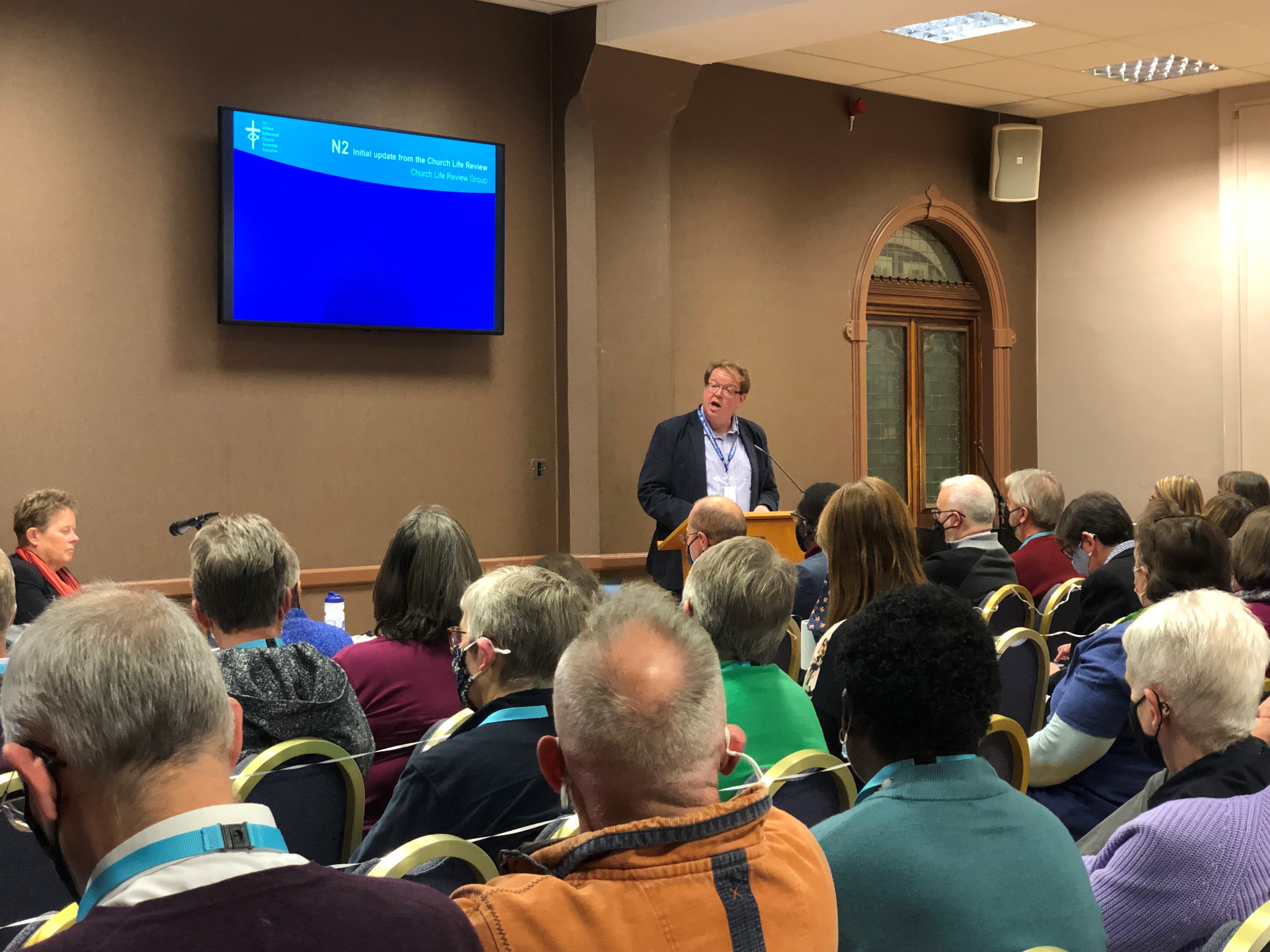 The autumn meeting of the United Reformed Church (URC) Assembly Executive opened on 22 November at at High Leigh Conference Centre, Hoddesdon, with a welcome by the Revd Clare Downing, Moderator of the URC General Assembly.
The autumn meeting of the United Reformed Church (URC) Assembly Executive opened on 22 November at at High Leigh Conference Centre, Hoddesdon, with a welcome by the Revd Clare Downing, Moderator of the URC General Assembly.
Session One
Opening worship was led by the Revd Helen Everard, Moderator’s Chaplain. She introduced a hymn by Graham Adams, ‘We come to praise our God’. Its assertion that “we who commit to Christ… love diversity” was the focus of the reading from the book of Acts – the story of Cornelius, a centurion who accepts the gospel preached by the apostle Peter and is remembered as the first named gentile to convert to Christianity.
Members listened to the Revds Mike Thomason and Peter Hills speak about their “heroes” (Cornelius and Jesus respectively) and their experiences of military chaplaincy, which they understood in terms of being present, and serving others, often as “unsung heroes”. They spoke of situations in which they had made an impact that maybe they didn’t realise at the time. Chaplaincy is “walking alongside people where they are”, Mike said.
As a way of entering into prayer, each member was given a paper bag. On one side, members were invited to name situations, people or concerns on their mind that required to be “left behind” for the duration of Assembly business; and on the other, they named an issue or expectation that they felt would be important for them over the course of the meeting.
Worship concluded with the singing of the hymn “Christ triumphant, ever reigning”.
The Revd Dr John Bradbury, General Secretary, then welcomed members to the meeting. He told members that Mr Peter Pay, URC General Assembly Moderator, was unable to be present owing to the progression of a terminal illness. The meeting held Peter in prayer.
Minutes from the March 2021 Mission Council were accepted. There were no matters arising.
Paper A1: Business Committee
The General Secretary, the Revd Dr John Bradbury, presented proposed changes to the standing orders of Assembly (which also apply to Assembly Executive, synods and committees).
During lockdown, a new set of standing orders was created for virtual meetings. Now face-to-face meetings have resumed, but some meetings are still virtual, while others are now hybrid. The proposed changes to standing orders adapt them so that they now cover face-to-face, virtual and hybrid meetings.
Elements of consensus decision-making were omitted from rules for virtual meetings, said Dr Bradbury, but it has become clear that they would still be useful in virtual meeting and are so are being reinstated. ‘These proposals bring together the best parts of the virtual rules and the face-to-face rules,’ he said.
Dr Bradbury pointed out that the 2021 General Assembly, following the rules for virtual meetings, achieved the rare feat of getting through all its scheduled business on time, so it would be a shame to lose that advantage.
He told the Executive that the standing orders were a work in progress and would continue to be revised as experience required.
 Assembly Executive discussed whether the requirement for 67% majority was too low to reflect anything like consensus. There was some support for raising that percentage, but the meeting decided to refer the question to the Business Committee, who may revise the standing orders for future meetings, and to continue with the proposed rules for the present meeting.
Assembly Executive discussed whether the requirement for 67% majority was too low to reflect anything like consensus. There was some support for raising that percentage, but the meeting decided to refer the question to the Business Committee, who may revise the standing orders for future meetings, and to continue with the proposed rules for the present meeting.
The Clerk of Assembly, the Revd Dr Michael Hopkins, moved a third resolution: ‘Assembly Executive resolves to add to rules of Procedure 1.3: “unless they resolve to use the standing orders of the 2018 General Assembly”.
The resolutions were all passed.
Session two
Paper H2: Retired Ministers’ Housing Society Subcommittee New Terms of Reference
The Revd Paul Whittle, Convenor of Ministries Committee, presented proposals for new terms of reference for the Retired Ministers’ Housing Society Subcommittee (RMHS) subcommittee, which he said were so different that they in effect created a new subcommittee.
Mr Whittle said that he had expected the Ministries Committee to abolish the subcommittee as its operations were indistinguishable from the RMHS board. But the subcommittee made a strong case for its continued existence with different structure and remit. It is needed, he said, as an advocate for ministers to the RMHS and for the RHMS to denomination.
Paper H4: Safer Election of Elders
The Revd Paul Whittle, Moderator of the National Synod of Scotland and conventor of the Ministries Committee presented Paper H4. Paul spoke about the gifts of eldership and how the role is one of the high points of the United Reformed Church, however he feared that sometimes the roles was devalued or belittle.
As the role is of importance, such as the role of Minister of Word and Sacrements, he strongly recommended that it would be good practice to have in place a process for the safer election of Elders.
He noted that as decisions are made by councils of the Church, it could seem that telling churches how to elect their elders is stepping beyond the bounds of where we should be. But he said, that the Ministries Committee had given a great deal of thought to the issue, and believed it was right to give strong advice on the matter.
Clarity was sought from the floor on whether someone needed to be a member of a church for a year, as they might have been a member of a local URC somewhere else and then moved; at what stage would a DBS be required, why not before being elected; on whether a person under 18 would need a DBS; the definition of the term ‘new’ elder.
Paul, and the Nicola Furley-Smith, Secretary of Ministries, clarified the above points saying that regardless if someone had been a member of another church for 10 years, they would need to be a member of a church for a year to be elected an Elder, all new Elders should begiven the most up-to-date guidance documents, people can only apply for a DBS/PVG once a regulated activity has begun, and so a self-declaration form is required before being elected an Elder to advise that the person is confirming anything that would need to be declared is being done so before the DBS/PVG is sought, or that nothing will be found once it has been applied for.
Questions raised included the process that should be followed regarding LEPs, where an Elder is called a Deacon due to belonging to another denomination, on whether the URC process would be followed or the partner church; the end date of Elderships; and who or what is ultimately responsible for making decisions in the URC and communicating the decision to local churches.
Paul simplified that if someone is doing the role of Elder, then the guidance discussed should be applied. In regard to decisions Paul referred to the conciliar system of the URC and that the ultimate authority would lay with the local church meeting. Regarding set terms, Paul advised that this also would lay with the local church but is a valuable point for Assembly Executive to consider.
After amendments were discussed and agreed to make the wording in the paper clearer, a vote was held, and the resolution passed by consensus.
Paper I4 Emergency resolution: Conversion therapy
Sarah Lane Cawte, Convenor of Mission Committee, presented an emergency resolution to make a statement on conversion therapy. This statement will be the United Reformed Church’s contribution to a UK government consultation on conversion therapy. It is brought as an emergency resolution, because the consultation was launched only recently and ends on 10 December.
‘It is important to do this,’ said Ms Lane Cawte, ‘as silence can convey the wrong message. The government has specifically invited Churches to participate.
The resolution condemns conversion therapy as ‘unethical and potentially harmful’. It calls on members and ministers to refuse to participate conversion therapy and bans conversion therapy from taking place in the name of the URC. It supports the proposed ban on conversion therapy and urges the government to strengthen its proposals.
‘It does not convert,’ said Ms Lane Cawte; ‘it does not provide therapy.’ She pointed out that anyone who disagrees with wording of the statement can take part in the consultation as an individual.
Assembly Executive warmed to the resolution. Some questions were asked about whether a minister who is asked by a church member to pray for them might fall foul of these proposals. Ms Lane Cawte said that the definition of conversion therapy quoted in the paper and widely accepted, clearly does not include simply praying with someone and has a specific end goal in mind.
Some changes to the wording were discussed, but not agreed upon. The resolution was then passed unanimously.
Paper B1: Children and Youth Friendly Synod Scheme
The Revd Paul Robinson introduced Paper B1, for information purposes, advising that the new Children and Youth Friendly Synod Scheme had been rolled out across the denomination successfully.
For information, the URC’s new Children and Youth Friendly Church Scheme first launched in March 2020. It replaces the old Child Friendly Church Award and is a reflective and encouraging process which any church can undertake with the support of a CYDO+ or similar to help grow their engagement with children, families and young people.
Paul explained that the proposal introduces a renewed parallel scheme for synods that would offer the opportunity to reflect, recognise and celebrate significant steps taken to include all ages in the life of a synod; in the same way that the Eco Church and Eco Congregation scheme offer the opportunity for synods to engage in environmental issues at a strategic level.
Explaining how the renewed scheme would work, Dr Sam Richards, URC Head of Children’s and Youth Work, said: “A synod would establish a working group of all ages and approach the Children’s and Youth office at Church House, and we would appoint the CYDO+ from another synod to accompany the group through a reflective process. They would be given a booklet to work through which asks a series of questions to help them identify what they are already doing well and areas for development in relation to:
- Where they are starting from
- Visions and values
- Spirituality of children. young people and families and their relationship with God
- Mission and outreach
- Equipping and supporting those working with children, young people and families
- Decision making and inclusion
- Next steps
Sam advised that the accompanying CYDO+ would then submits a summary report to herself, recommending the Synod for approval once they are happy to do so. Following approval, a plaque and certificate would be awarded to the Synod, and the award would be reported to General Assembly.
 Paper N2: Initial update from the Church Life Review
Paper N2: Initial update from the Church Life Review
The Church Life Review Group held its initial meeting held on 25-27 October 2021 and its first report was before the Assembly Executive.
The General Secretary, the Revd Dr John Bradbury, opened up the work of the review by way of leading into a “question-asking, information session”. This wasn’t to be a decision-making session, said the Moderator.
Dr Bradbury began by setting the work in what he was said was quite a “the largest possible context” of God’s ways with the world and God’s people. He spoke of God’s relationship and covenant with God’s people, extending back to the divine promise to Noah (a rainbow promise that would form the basis of the Rainbow Litany in the day’s closing worship).
Dr Bradbury, a church historian, especially emphasised the way the Church has changed, living though times of upheaval – beginning a “tempestuous journey” of 2,000 years within the Roman Empire. In another millennium, the Reformation transformed the Church both Catholic and Protestant. God’s faithfulness is witnessed in eternity, he said; the Church’s experience of it is continually changing.
He asserted that the Church is currently facing a period of upheaval the like of which has not been experienced since the Reformation. “I believe God is calling us to refashion our life as a Church” – a challenging call to the Church in this corner of the globe. He admitted that this might be a scary prospect.
The traditions of the URC have emphasised in the past that “we are not the establishment – we are not conformist”. But perhaps that culture was just a little too interested in what it was not – and not primarily concerned with being the Church. Are we too concerned with a culture that is dying? he asked.
Though it may be tempting to sit back and say the Church is thriving in other parts of the world, Dr Bradbury said it is our calling to be a faithful people, open to the challenge that God may be “emerging something radically different from us”, from the Gospel and from the other side of Holy Saturday: the life of the Resurrection. The Church Life Review is a small way to respond to that challenge, but he argued that most moments of renewal come not from grand plans and schemes, but from a rather mundane returning to roots – revisiting Scripture and growing green shoots in local situations.
This is a time to stare hard at difficult issues, he continued. We are running out of people, as the review group’s report outlines. (The majority of churches that close, the report argues, do so because they can no longer find people able to sustain the practical running of a congregation.) Deployment of ministers seems broken.
Dr Bradbury said we need to think carefully about our stewardship of resources, not least financial resources. “We do not know how we spend the resources of the General Assembly and the synods,” said the report. Reflection will therefore also involve some careful theological thinking about money alongside thinking about the front line of work.
It is proposed that Theos, a think-tank that specialises in qualitative research into the relationship of faith and society (www.theosthinktank.co.uk) be commissioned to do necessary research across the denomination, and Moore Kingston Smith (the firm that audits the United Reformed Church Trust accounts) will drill down into the accounts, helping us in gaining clarity over our income, expenditure and assets as the family of the URC.
The General Secretary concluded that he was not offering a vision of what the future of the URC would look like, but he was offering the beginning of a journey – to discern “the next tentative steps” at this moment in the 21st century. “An understanding of our resources is a necessary task before we can discern what the Church can be in the future.”
In response to questions, Dr Bradbury suggested that the process of review is shared by most denominations in the UK – “but we’ve not found a way to join up those responses”. He suggested that when the going gets tough, we tend to look inward; and admitted he wasn’t quite sure how to develop collaboration ecumenically, though he said local examples (such as in Cumbria) indicate that there might be possibilities.
Money to fund the review has been drawn from a fenced “pot of money” under the direct “control” of the General Secretary that had accumulated income of £120,000. He added that the firms being used to undertake research have been commissioned on the basis of good advice: “they are people who we trust and who know who we are”.
The Convenor of Education and Learning, Alan Yates, with a background in finance, cautioned that it’s important to look beyond the figures – how much a synod spends on an area of work isn’t necessarily an indication of how much it values that work. It may simply not have the money.
Dr Bradbury said there was work to be done on how the researchers would identify representative examples of churches and ministry; however, the Church Life Review group itself includes expertise in qualitative research work, and can facilitate these decisions.
He also indicated that the Church can do some of its own research – perhaps using the annual church returns (online from this year) as one source of information; perhaps looking at some representative sets of local church accounts. We need to explore the fact that 40% of Ministry and Mission (M&M) money is spent on stipendiary ministry and 60% on “other things”. What are those other things, and are there perhaps better ways of balancing our levels of expenditure? It will be a time-consuming task to gather all this information, which is why external support is required.
Concluding questions for this session, one member asked why the Bible didn’t seem to feature very much in the report. Dr Bradbury responded that Scripture should undergird “everything we do and are”. We should not simply “do Scripture” alongside the other work. It should inform all the work, and not be referred to about certain topics.
The topic will be discussed further in later sessions of the meeting.
Reporting by: Andy Jackson, Ann-Marie Nye, Laurence Waring, and Steve Tomkins
